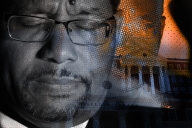You have /5 articles left.
Sign up for a free account or log in.
Michigan State University has removed a tenured professor of creative writing from the classroom following anti-Republican and other statements he made on the first day of class.
Parts of William Penn’s course and personal introduction were downright benign -- he talked about his rabbits, Falafel and Chickpea. He also warned students that, as a “child of the ’60s,” he wasn’t always politically correct.
But at least an eight-minute segment apparently captured by a student (and embedded below) contained remarks that university administrators say crossed the line between free speech and disrespect, and may have “negatively affected the learning environment.”
“When you get older you get cheaper,” Penn can be heard saying in the video, as uploaded onto YouTube by the conservative watchdog website Campus Reform, explaining why he is a conservative Democrat. “That's what old people do. If you go to a Republican convention in Florida, you see all those old people with their skins cells sloughing off them -- they're cheap.”
He continued: “They don't want to pay taxes because they've already raped this country and gotten everything out of it they possibly could. They don't want to pay for your tuition because who are you? Well, to me you're somebody, and [looking at a student who appears to be frowning] you can frown if you want. [Addressing that student] You look like you're frowning, are you frowning?”
Penn told students: “I absolutely don’t mean to offend you – even if you are a Republican, I don’t mean to offend you in this class. Outside of class is a different matter, O.K.?”
The professor’s tone was sometimes playful, and it’s unclear how much of what he said was in jest, or partial jest. Students can be seen laughing throughout the video.
Still, his commentary on what he called black voter suppression in North and South Carolina by “dying white” Republicans was clearly serious, as was his condemnation of “greedy bastards” who are “rich like Mitt Romney and hide all [their] income offshore in the Cayman Islands.”
The video was taken Aug. 29, and uploaded on Tuesday, in both abbreviated and full versions. The shorter version had been viewed more than 85,000 times as of Thursday evening.
University officials were made aware of the video on Tuesday and began an immediate review, Kent Cassella, a university spokesman, said in a statement. Michigan State is “committed to creating a learning environment that is characterized by mutual respect and civility where diverse ideas can be explored.”
Cassella said the dean of the College of Arts and Letters, along with a representative from the provost’s office, met with Penn, “who acknowledged that some of his comments were inappropriate, disrespectful and offensive and may have negatively affected the learning environment."
The professor’s duties teaching the "Literatures, Cultures, Identities" course have been assigned to another faculty member.
Students were notified of the change via e-mail on Thursday morning.
Another university spokesman said that Penn remains a paid member of the faculty, engaging in research and service, and no decision has been made as to when he will return to the classroom.
Penn did not respond to requests for comment.
External Perspectives
Faculty free speech experts said Penn’s comments may or may not have warranted his suspension from teaching, and that the appropriateness of his remarks likely hinges on their relevance to course content. But Penn should have remained in the classroom until a hearing in front of fellow faculty members could be arranged, so long as he wasn't an immediate threat to students, some of those experts said.
A Michigan State spokesman said he was unaware of plans for such a hearing.
Will Creeley, director of legal and public advocacy for the Foundation for Individual Rights in Education, said in an e-mail: “As FIRE has long maintained, students do not possess a general ‘right not to be offended’ on campus -- and that includes within the classroom. Federal courts have made clear for decades that public institutions like Michigan State University may not privilege ‘civility’ over the First Amendment."
Academic freedom needs "breathing room," and free speech in the classroom should be protected when it is germane to the subject being taught, he said. "That determination is properly made by Professor Penn's academic peers."
Greg Scholtz, director of academic freedom, tenure and governance for the American Association of University Professors, said only an elected body of Penn's fellow professors could determine whether or not his speech constituted misconduct or incompetence warranting a "severe sanction," such as suspension from teaching, according to AAUP policy.
Neal McCluskey, associate director for the Center for Educational Freedom at the Cato Institute, a libertarian think tank, said objectionable speech was a "huge problem" for public universities, which must balance "compelled taxpayer support" against academic freedom.
"Should Professor Penn choose to fight his suspension, he will likely invoke academic freedom and free speech, as we saw Ward Churchill do," McCluskey said in an e-mail, referring to the former University of Colorado professor of Native American history who was fired following public objection to controversial remarks he made about victims of 9/11. He took his appeal to the U.S. Supreme Court, which ultimately declined to hear his claims of protected speech under the First Amendment. (Note: This sentence has been updated from an earlier version.)
If Penn appeals, claiming his speech was protected, McCluskey said, "I think the line [Michigan State] is likely to draw – and what is the norm, I believe, for these kinds of matters – is whether Penn’s speech was related to his subject matter."
At least immediately, he said, it appears that it was not.
Neil Gross, a professor of political science at the University of British Columbia who has written extensively about faculty politics, said in an e-mail that he didn't know what impact Penn's speech may have had on his students, but guessed that they might be more "bewildered" than swayed in any one political direction.
But Penn's case raises another salient point, he added -- that of faculty political speech in the digital age, when every student is armed with a smartphone.
"Cameras in the lecture hall raise intellectual property questions that may not arise elsewhere, but going forward professors, like other workers, are going to have to get used to the kind of scrutiny cameras make possible," he said.









